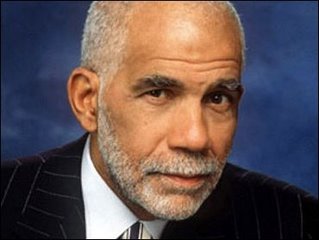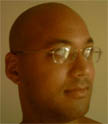Ed Bradley

"Be prepared, work hard, and hope for a little luck. Recognize that the harder you work and the better prepared you are, the more luck you might have."
- Ed Bradley
The 1999-00 season marks Co-Editor Ed Bradley's 19th on 60 Minutes. He joined the broadcast as co-editor during the 1981-82 season.
Bradley also reports for primetime specials. His report for 60 Minutes II, "Unsafe Haven" (April 1999), made headlines for exposing unsafe restraining methods and poorly trained workers inside the nation's largest chain of psychiatric hospitals. Another primetime report, "Town Under Siege" (December 1997), about a small town battling the oil industry over toxic waste, was hailed as one of the Ten Best Television Programs of 1997 by Time magazine.
Prior to joining 60 Minutes, Bradley had been a principal correspondent for CBS Reports (1978-81), after serving as CBS News White House correspondent (1976-78). He was also anchor of the CBS Sunday Night News (November 1976-May 1981) and of the CBS News magazine "Street Stories" (January 1992-August 1993).
Bradley was awarded the Robert F. Kennedy Journalism Award grand prize and television first prize for "CBS Reports: In the Killing Fields of America" (January 1995), a three-hour documentary about violence in America, which he co-anchored and reported.
His 60 Minutes work has gained much recognition, including his most recent award, a George Foster Peabody last year for "Big Man, Big Voice" (November 1997), the uplifting story of a German singer who becomes successful despite his birth defects.
In 1995, he won his 11th Emmy Award for a 60 Minutes report on the cruel effects of nuclear testing in the town of Semipalatinsk, Kazakhstan, a report that also won him an Alfred I. duPont-Columbia University Award in 1994. That same year, he was honored with an Overseas Press Club Award for two 60 Minutes reports that took viewers inside sensitive military installations in Russia and the United States.
In 1985, he received an Emmy Award for "Schizophrenia," a 60 Minutes report on that misunderstood brain disorder. In 1983, two of Bradley's reports for 60 Minutes won Emmy Awards: "In the Belly of the Beast," an interview with Jack Henry Abbott, a convicted murderer and author, and "Lena," a profile of singer Lena Horne.
He received an Alfred I. duPont-Columbia University Silver Baton and a 1991 Emmy Award for his 60 Minutes report "Made in China," a look at Chinese forced-labor camps. He received another Emmy for the report "Caitlin's Story" (November 1992), an examination of the controversy between the parents of a deaf child and a deaf association.
In addition to "In the Killing Fields," his work for CBS Reports has included: "Enter the Jury Room" (April 1997), an Alfred I. duPont-Columbia University Award winner that revealed the jury deliberation process for the first time in front of network cameras; "The Boat People" (January 1979), which won Alfred I. duPont-Columbia University, Emmy and Overseas Press Club Awards; "The Boston Goes to China" (April 1979), a report on the historic China visit by the Boston Symphony Orchestra, which won Emmy, George Foster Peabody and Ohio State Awards; "Blacks in America: With All Deliberate Speed?" (July 1979), which won Emmy and Alfred I. duPont-Columbia University Awards; "Return of the CIA" (June 1980); "Miami: The Trial That Sparked the Riots" (August 1980); "The Saudis" (October 1980) and "Embassy" (January 1981).
Bradley's coverage of the plight of Cambodian refugees, broadcast on the CBS Evening News with Walter Cronkite and CBS News Sunday Morning, won a George Polk Award in journalism. He also received a duPont citation for a segment on the Cambodian situation broadcast on CBS News' Magazine series.
He covered the presidential campaign of Jimmy Carter during Campaign '76 and served as a floor correspondent for CBS News' coverage of the Democratic and Republican National Conventions from 1976 through 1996.
In addition, Bradley contributed reports to two significant CBS News specials, "48 Hours on Crack Street" (1986), the broadcast from which the CBS News magazine 48 Hours evolved, and "The Soviet Union--Seven Days in May" (1987).
Bradley joined CBS News as a stringer in its Paris bureau in September 1971. A year later, he was transferred to the Saigon bureau, where he remained until he was assigned to the CBS News Washington bureau in June 1974.
He was named a CBS News correspondent in April 1973 and, shortly thereafter, was wounded while on assignment in Cambodia. In March 1975, he volunteered to return to Indochina and covered the fall of Cambodia and Vietnam.
Prior to joining CBS News, Bradley was a reporter for WCBS Radio, the CBS owned station in New York (August 1967-July 1971). He had previously been a reporter for WDAS Radio in Philadelphia (1963-67).
Bradley was born June 22, 1941 in Philadelphia. He was graduated from Cheyney (Pa.) State College in 1964 with a B.S. in education.
-------------------------------------------------------------
Nov. 9, 2006 — Ed Bradley, one of television's most prominent African-American journalists, died of complications from leukemia Thursday. He was 65 years old.
A longtime correspondent for CBS News' "60 Minutes," Bradley's probing questions and salt-and-pepper beard distinguished him for millions of TV viewers. He died this morning at Mount Sinai hospital in New York City.
Bradley was diagnosed with leukemia two years ago but was in remission. He apparently took a turn for the worse two weeks ago, contracting pneumonia and succumbing to the disease.
Colleagues and fans remembered him fondly. "He was the equal of all the celebrities he interviewed, which is why he got so much rich material out of them … because they knew he understood them," said ABC's "Nightline" correspondent Vicki Mabrey, who worked with Bradley at CBS. "I used to call him Mr. Cool."
Bradley, who first joined "60 Minutes" in 1981, won 19 Emmy Awards, a Peabody Award, a Robert F. Kennedy Journalism Award and the Paul White Award from the Radio and Television News Directors Association for his reports. The Philadelphia native started out as a DJ, making $1.50 an hour spinning Miles Davis and Billie Holiday records.
Bradley's last "60 Minutes" story — interviews with suspects and witnesses in the Duke rape case — made headlines. During his long career, Bradley interviewed a panoply of personalities — Michael Jordan, Muhammad Ali, Michael Jackson. Bradley got the only TV interview that Timothy McVeigh, the Oklahoma City bomber, granted to television.
Some of Bradley's other memorable reports included China's forced labor camps, the devastating effects of the Chernobyl nuclear disaster on a town in Kazakhstan, the impact of schizophrenia, and an unprecedented look at how juries deliberate.
While reporting for CBS in Vietnam, Bradley was once injured in a mortar attack, narrowly escaping death. "The guy who was standing 2 feet from where I had been standing was killed," he told Communicator magazine. "I got some shrapnel in my back, and it blew a hole through my arm. It just sliced through my arm, so I was lucky. I was lucky."
Although one of the first African-American reporters on national TV, Bradley refused to be pigeonholed by his race and doesn't remember letting racism intimidate him. "I probably was too naive to be afraid [when I started out]; that's because there was no one really ahead of me as a trailblazer," Bradley told USA Weekend. "I mean, I had nuns in school who always said to me, from the fourth grade on, 'You can be whatever you want to be.' I guess I believed them."
Bradley was known for his love of jazz, which first touched his heart when he heard "Teach Me Tonight" from Errol Garner's "Concert by the Sea." He frequently attended the New Orleans Jazz & Heritage Festival, and often sat in with the musicians. Bradley was lured back into DJ work when he recently hosted the "Jazz at Lincoln Center" radio show.
Accordingly, Bradley has said that his most memorable interview was with jazz legend Lena Horne. The intimate portrait, in which he alternated Horne's performances with his questions, became a "textbook example of what a great television interview can be," wrote TV Guide. "Lena" earned Bradley his first Emmy.
A lifelong sports fan, Bradley was a fixture at New York Knicks basketball games and the U.S. Open tennis tournament.
Bradley was married to the artist Patricia Blanchett and had homes in Woody Creek, Colo., and New York City.
taken from Top Blacks




0 Comments:
Post a Comment
<< Home